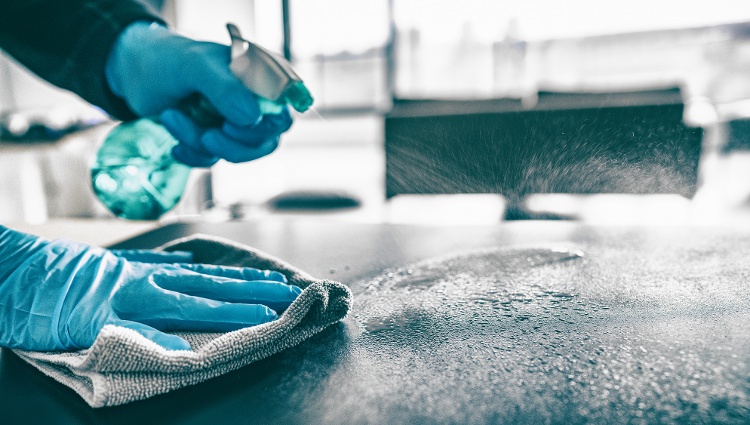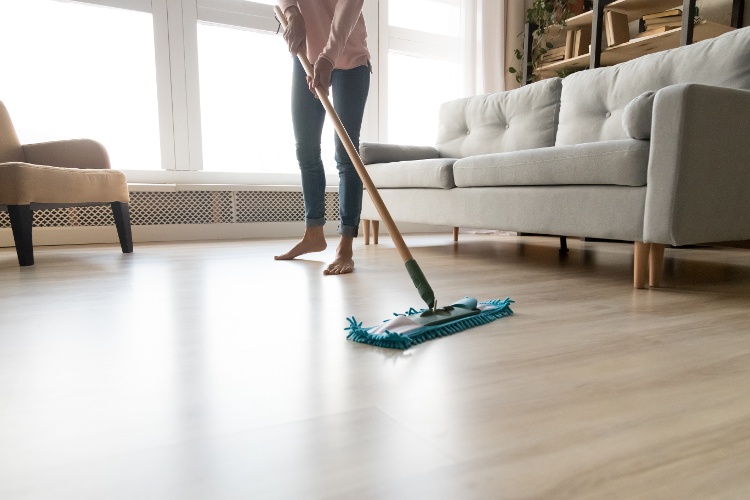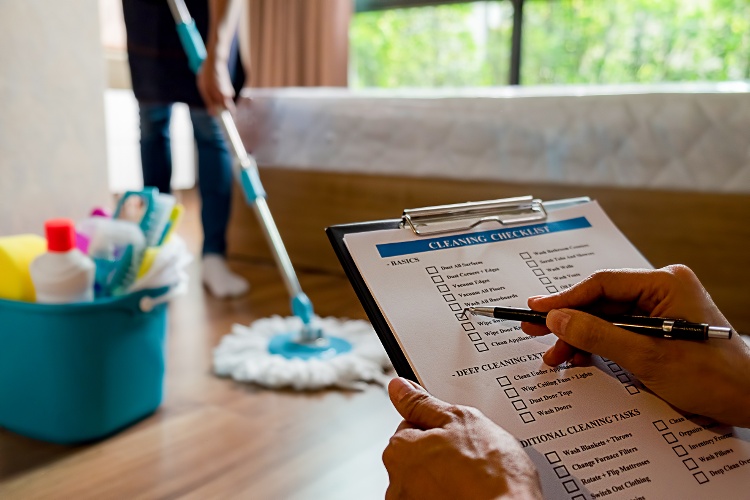What Can Be Charged For Repairs And Cleaning Of A Rental
Last updated on October xix, 2021
Dealing with dirty tenants can exist a big problem for landlords. Holding value can go downwards due to pest infestations or mold caused by dirt, food, and water puddles. Some cities and states may allow a landlord to accuse for cleaning if the property is excessively dirty or left in an unlivable condition. In this article, nosotros'll discuss when a landlord can and can not accuse a tenant for cleaning, tips on how much to charge, and how to gear up the right expectations for cleaning with a tenant to help avoid conflict if and when the tenant moves out. Charging for cleaning in a rental property depends on several variables. For instance, a landlord should consider the condition of the property when the tenant moved in versus the state of the property when they are moving out, and if extra cleaning is needed to a higher place what could be considered normal. At that place are several key questions to inquire yourself before charging a tenant for cleaning: After answering these questions, it's easier to decide how much to charge a tenant for cleaning. As a dominion of pollex, move-out cleaning for a single-family home might range from $300 to $500 depending on the number of bedrooms and bathrooms and the square footage of the house. Move-out cleaning Standard cleaning when a tenant moves out includes: Additional cleaning Single-family rental homes may too require additional cleaning based on the amenities and pattern of the home, and how make clean or messy the tenant was: If cleaning fees get beyond what is considered normal usage a landlord may be able to utilise the tenant security eolith for cleaning. In some cases, a landlord may exist able to accept a tenant to court to cover additional cleaning costs if they have left the property in an uninhabitable condition. Earlier doing this, exist sure to check with your property managing director and review the local and state landlord-tenant laws to learn what yous can and tin can not deduct from the security eolith. One mistake that some first-time landlords make is to view the security deposit every bit a source of actress income. Generally speaking, returning the security deposit to the tenant can be a ameliorate business organisation practice for a rental belongings owner. That way, arguments with a tenant are minimized and landlords avoid being taken to small claims court by the tenant. A residential lease should require the tenant to return the property as clean as it was when they moved in. Withal, landlords who don't keep detailed records – including a copy of the move-in walkthrough, photos, and detailed notes from periodic belongings inspections – could terminate up losing in court and be forced to pay double or triple amercement to the tenant for mishandling the security deposit. A landlord can typically charge a tenant for cleaning needed to return the belongings to the condition at the time the tenant moved in. But, a landlord can not charge the tenant extra – or employ the security deposit – to pay for normal wear and tear. Determining what is normal habiliment and tear and what is non can be difficult. Here are some examples of serious damaged vs. normal wear and tear in a rental property: Depending on the country law, a landlord may be able to charge a not-refundable fee for cleaning. But, that may non exist a proficient idea. For example, if the non-refundable cleaning fee is $150 and actual cleaning costs $300, a landlord will have to become out of pocket and make upwardly the difference. Hourly rates charged to a tenant for cleaning should exist comparable to what a cleaning company would accuse. Many local cleaning companies have websites to estimate the cost of professionally cleaning a rental property. Unless required in the rental agreement and allowed by state constabulary, the tenant does not have to take the property professionally cleaned. Before the tenant moves out, a landlord could propose to the tenant that the identify be professionally cleaned to avoid any issues with the security deposit being fully returned. Landlords are mostly responsible for cleaning the carpet in a rental property. In between tenants, the carpet should be professionally cleaned to assist extend the useful life of the rug. Periodically tile and wooden floors should also exist rewaxed or resealed. Performing routine inspections of the interior of the property is the best way to ensure tenants are keeping the home clean. The tenant should be notified of whatsoever parts of the house that need to be cleaned, with detailed notes and photographic evidence included in the inspection report. A landlord tin attach a cleaning annex or add a cleaning clause to the standard residential lease contract. The addendum or clause modifies or adds to what is already in the lease, and can exist used to describe tenant cleaning responsibilities that are specific to the belongings, such as protecting the garage floor or regular swimming pool cleaning. Yes. Adept resources for a cleaning addendum and cleaning clause include The Landlord Protection Agency (LPA) costless landlord forms, eForms, Law Insider cleaning sample clauses, RentPrep housekeeping addendum, and a cleaning addendum from the BiggerPockets blog. While it's possible for a landlord to charge a tenant for cleaning, the ideal solution is to find a tenant who volition go along your property make clean and maintained as if it were their ain habitation. Thoroughly screen tenants online and speak to the tenant's previous landlord to larn if they kept the property clean. The lease should leave as trivial as possible to the tenant's interpretation of what is and isn't clean. It'southward a good idea to use a cleaning addendum or a special cleaning clause that details the tenant'south responsibility for keeping the property clean to avert issues when and if the tenant decides to move out.

Questions to enquire before charging for cleaning

How much to charge for cleaning

Can a tenant security deposit exist used for cleaning?

Serious damage vs normal clothing and tear
Normal wear and tear Excess filth or damage Faded curtains or blinds Discoloration from fume or dust Hard water stains caused by water Moldy grout or tiles in the bathroom Minor marks on the wall backside the door Large scrub marks on the wall Ordinary clay or spots on the rug or floors Permanent food or pet stains Worn refrigerator shelf Nutrient debris in the fridge Stained older porcelain fixtures Crud or mold buildup in the bath Dingy mini blinds from dust buildup Permanent finger stains on blinds Bathroom mirror with black spots due to age Mirrors coated with makeup Boring drains due to mineral deposits Hair or germ-free items clogging pipes Minor pet hair forth the baseboards Flea infestation from an unkempt pet Tire marks on the driveway or garage Oil and grease stains on concrete 
Common FAQs most charging for cleaning
Can a landlord accuse a tenant a nonrefundable cleaning fee?
How much tin a landlord charge per hour for cleaning?
Does the home have to be professionally cleaned?
Who is responsible for cleaning the rug in a rental property?
What is the all-time mode to make sure tenants are keeping the belongings clean?
How does a cleaning annex for a residential lease work?
Are there gratis cleaning addenda and cleaning clause forms?
Final thoughts on this topic

Source: https://learn.roofstock.com/blog/how-much-can-landlord-charge-cleaning
Posted by: hartidowed.blogspot.com


0 Response to "What Can Be Charged For Repairs And Cleaning Of A Rental"
Post a Comment